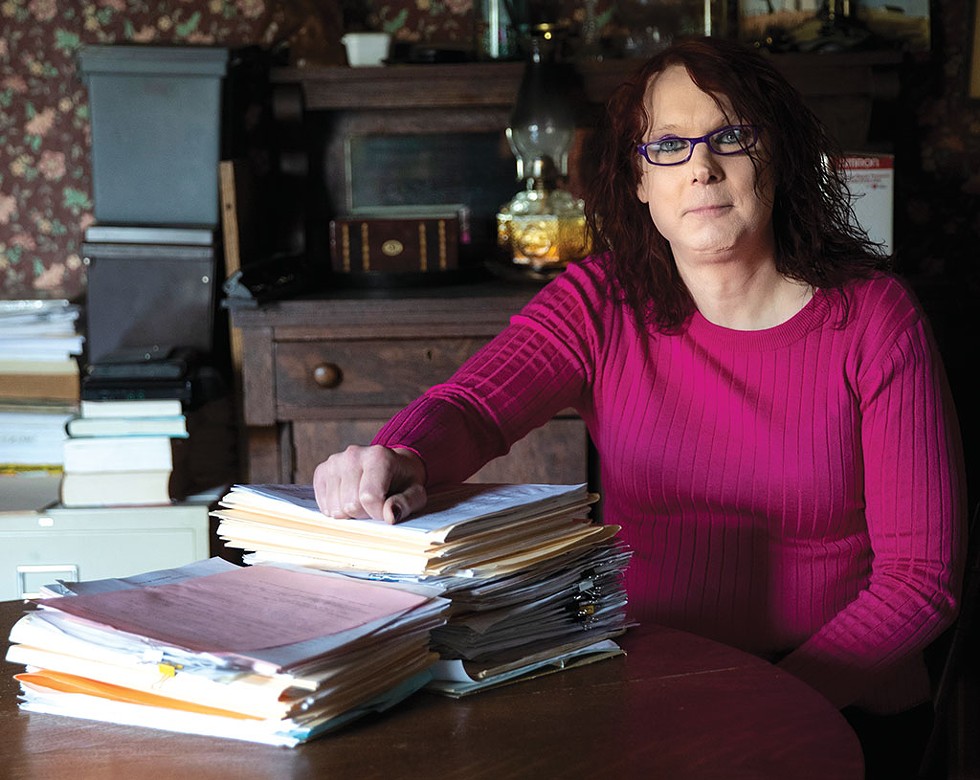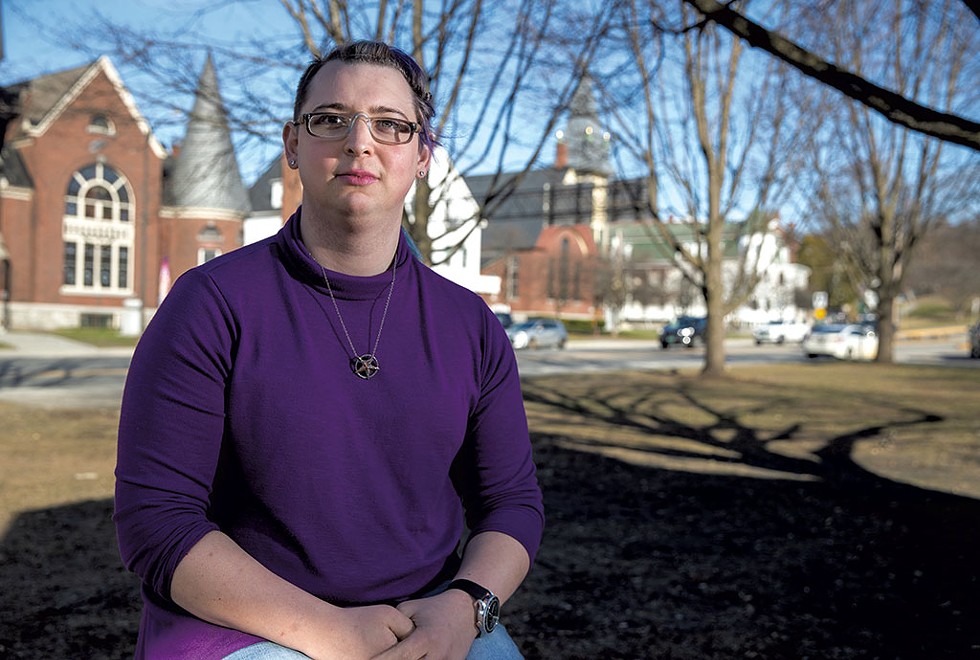Switch to the mobile version of this page.
Vermont's Independent Voice
- News
- Arts+Culture
- Home+Design
- Food
- Cannabis
- Music
- On Screen
- Events
- Jobs
- Obituaries
- Classifieds
- Personals
Browse News
Departments
-
Education

Scott Official Pushes Back on Former State…
-
News

Burlington Budget Deficit Balloons to $13.1 Million
-
Education

Senate Committee Votes 3-2 to Recommend Saunders…
- Court Rejects Roxbury's Request to Block School Budget Vote Education 0
- Norwich University Names New President Education 0
- Media Note: Mitch Wertlieb Named Host of 'Vermont This Week' Health Care 0
Browse Arts + Culture
View All
local resources
Browse Food + Drink
View All
Browse Cannabis
View All
-
Culture

'Cannasations' Podcaster Kris Brown Aims to 'Humanize'…
-
True 802

A Burlington Cannabis Shop Plans to Host…
-
Business

Judge Tosses Burlington Cannabiz Owner's Lawsuit
-
Health + Fitness

Vermont's Cannabis Nurse Hotline Answers Health Questions…
-
Business

Waterbury Couple Buy Rare Vermont Cannabis License
Browse Music
View All
Browse On Screen
Browse Events
Browse Classifieds
Browse Personals
-

If you're looking for "I Spys," dating or LTRs, this is your scene.
View Profiles
Special Reports
Pubs+More
Vermont Has Endangered Transgender Prisoners. Change Is Coming — but Is It Enough?
Published April 28, 2021 at 10:00 a.m.
click to enlarge 

- James Buck
- Stephanie Mattson spent almost two decades in men’s correctional facilities in Vermont before she came out as a woman in 2016.
For Jasmine Klein, life in Vermont's prisons has been a punishment beyond her sentence.
Last November, Klein, a transgender woman, was transferred to Chittenden Regional Correctional Facility, the state's only prison for women, from Tallahatchie County Correctional Facility, a men's prison in Mississippi, where Vermont sends some 170 members of its incarcerated population. In Tallahatchie, she said, a man drugged her and forced her to have sex with him, which made her feel so dehumanized that she attempted suicide.
Klein, who grew up in Rutland, has Asperger's syndrome; in school, her peers bullied her for her disabilities and, as she got older, for being attracted to boys. Her grandmother was the only person in her family who didn't make her feel ashamed of her sexuality. When Klein was 16, she said, her grandmother asked her if she felt like a woman. Klein was years away from coming out, but she still remembers how good it felt to be seen without judgment. "If my grandmother were still alive," said Klein, "I probably wouldn't be in jail today."
In 2011, when she was 18, she and two friends broke into a laundromat in Rutland and stole $500 in quarters. "I was trying to fit in and show people that my sexuality didn't define who I was," she said. "I just wanted to be like all of them." Klein, who still presented as male, was charged with burglary and served time at Marble Valley Regional Correctional Facility in Rutland. A year later, while Klein was out on community supervision, she got drunk at a party and had sex with a 14-year-old; in court filings, Klein said she hadn't known his age. She was charged with sexually assaulting a minor and sentenced to 10 years in prison.
While Klein was awaiting her sentence in 2013, she became only the second person to come out as transgender at Southern State Correctional Facility in Springfield. The first, a transgender woman named Cammie Cameron, was a friend of Klein's from Rutland. Klein said Cameron gave her the courage to come out. "I was scared, because I saw the way Cammie got treated," Klein said. "But I knew that I had to, no matter what, because it felt worse to hide all the time."
Klein's fears came true. Prison staff constantly misgendered her; once, when she tried to correct a guard at Southern State, she said, he called her a "faggot." She spent six years rotating among most of Vermont's five men's correctional facilities, an experience she described as "torture." More than once, she said, she tried to kill herself.
At Chittenden Regional, Klein, now 28 and a year and a half away from her release date, hoped she would finally be treated with more respect. Instead, she said, she got the overwhelming message that she didn't belong. Whenever one corrections officer in her housing unit thought Klein was out of earshot, she said, he would complain to residents that he was tired of having to watch his language around her and the other transgender women in the facility. More than one roommate told her that they didn't want to live with "a trans."
Then, in late February, Klein said, another roommate manipulated her into sex by threatening to tell an ex-boyfriend, whom she claimed was a Hells Angel, that Klein had raped her. "She told me that if I told any staff what happened, I wouldn't be believed, because I'm trans," Klein said.
In December 2019, Seven Days exposed a yearslong epidemic of sexual abuse and harassment of female employees and incarcerated women by male corrections officers at Chittenden Regional. But the mistreatment of transgender people in Vermont's correctional system has garnered less attention. Of the roughly 1,200 people currently in custody, 15 are registered in the system as transgender; all of them are transgender women. In 2015, the Department of Corrections adopted a set of guidelines, called Directive 432.01, to establish standards for how corrections employees should interact with the transgender people in their care. These standards include using appropriate pronouns, providing clothing and hygiene products that match a person's gender identity, and considering gender identity, not just sex at birth, when determining whether a transgender individual will be incarcerated with men or women.
But corrections employees have not always heeded those mandates. Current and former trans inmates, as well as advocates who work in Vermont's prisons, say that transgender people in the state's correctional system have been denied access to appropriate medical treatment and clothing, housed in dangerous situations, and subjected to insults from staff.
Most of this mistreatment happens within prison walls, hidden from public view. But in at least one instance, a corrections employee has used a social media platform to mock a transgender inmate. In July 2019, James Frank, an officer at Northwest State Correctional Facility in St. Albans, posted a rant on Facebook after his supervisors asked him to report to work a few hours early to monitor a transgender person on suicide watch. "Have to go in 4 hours early to sit and watch a he she who wants to hurt/kill self," Frank's post read. "SO sick of the LIBERAL BULLSHIT. I think it's just a p-ssy that won't do it anyway and needs attention."
A supervisor at the prison heard about the post and reported it; Frank was placed on paid leave. After an internal investigation and a Vermont Labor Relations Board hearing, interim Corrections Commissioner Jim Baker fired Frank in December.
Baker became commissioner in late 2019, after his predecessor, Mike Touchette, resigned in the wake of the Seven Days investigation. In Baker's view, the department's handling of Frank represents a shift in the culture of corrections over the last few years, which mirrors the evolution in thinking about gender identity in society at large. "That someone would report the conduct of a coworker for the way they were speaking about a transgender individual is, in itself, a signal of change," Baker said.
"I don't think corrections reflects anything different than what the community reflects as people become more educated and sophisticated in the way they deal with individuals who don't look like them," he continued. "And my goal is for the staff to be more educated and sophisticated about the understanding of individuals that identify as transgender."
Baker acknowledged that some corrections employees have displayed bigotry: "We have had individuals that maybe were homophobic, or maybe that were uneducated and unsophisticated," he said. Since becoming commissioner, he said, he has telegraphed to the department's 928 employees — administrators, prison staff, and probation and parole officers — that he won't tolerate such behavior. Under his command, all employees have been required to complete implicit bias training; in October 2020, the department hired the Moss Group, a Washington, D.C.-based criminal justice consulting firm, to conduct an audit of all its practices and policies, including its protocols related to the care of transgender inmates.
Advocates applaud these steps toward improvement, but the realities of incarceration, they say, have already done irreparable harm to transgender people. "The Vermont Department of Corrections is light-years ahead of other states' correctional systems in addressing the needs of trans folks, and light years behind where they could and should be," said Kim Jordan, director of the SafeSpace Anti-Violence Program at the Pride Center of Vermont, which supports incarcerated survivors of sexual violence.
In the correctional system, she said, transgender people experience trauma every day. "No matter what kind of individualized support we can provide them, they go back to their units, where the corrections officers might misgender them, deadname them" — refer to them by their former name — "remove their gender-affirming underwear and hygiene products, degrade them, and demean them," said Jordan. "That is violence."
She looks slightly askance at the department's recent efforts to treat the incarcerated transgender population with greater dignity and respect. "They don't want any more legal problems," she said. "But if the collateral impact of them protecting themselves is that no more harm comes to people, then yes, please."
Locked up with men
In December 2015, less than a year after corrections adopted Directive 432.01, Cammie Cameron, Klein's friend at Southern State, was brutally beaten by a man in an adjacent cell. Cameron, who is no longer incarcerated, sued the department in federal court in 2018 for denying her requests to be moved to a women's facility, violating its own directive and exposing her to an unreasonable risk of harm. Because the case is still pending, Cameron, through her lawyer, declined to be interviewed.
"Cammie was one of our first real transgender cases," said Al Cormier, corrections' chief of operations. "We really did pause and take a look at how we were doing things." In recent years, he said, corrections staff have become more cognizant of the risks that transgender people, particularly transgender women, face in men's prisons.
"Four or five years ago, if a transitioning individual came into our custody, people would kind of throw their hands up in the air and say, 'What do we do with them?' There wasn't a lot of thought put into it, whereas there really is a lot of thought put into it now, for the safety of the individual," Cormier said. "I see that as a big change for us."
Nevertheless, Cormier couldn't point to any specific changes in housing practices that Cameron's lawsuit had precipitated; to this day, he said, the department offers no specific training to its employees in addressing the needs of incarcerated transgender people.
Directive 432.01 stipulates that corrections must consider gender identity, not just sex at birth, when determining whether a transgender person will be sent to a men's or a women's prison. But the same provision leaves the final placement decision at the discretion of corrections officials, and, in practice, the department still houses most transgender people according to their sex at birth. As of late April, 10 of the 15 transgender women incarcerated by the State of Vermont were housed in men's facilities.
As recently as last year, some officials still seemed to be confused about the existence of transgender people in Vermont prisons. A February 2020 NBC News investigation into the lack of protections for transgender women held in men's prisons included an interview with David Turner, the facilities operations manager for corrections. In response to a question about how transgender inmates are housed in the state, Turner asked: "What is meant by transgender women? What is meant by transgender men?" The story noted that Turner refused to fulfill records requests until the NBC reporter had provided an explanation.
Slow to change
Advocates see a reluctance to implement substantial change, in spite of a growing consensus among corrections officials that the department needs to take a more progressive approach to caring for its transgender population.
In February 2020, Ashley Messier, who was formerly imprisoned at Chittenden Regional, founded the Women's Justice & Freedom Initiative with the goal of providing support for the queer and transgender community in the correctional system.
"One of my best friends who I was incarcerated with was a trans male in a women's facility," said Messier. "Watching his experience, and the things that people did and said to him, really made me realize that there was no dedicated advocacy for queer folks in the context of incarceration, and none specifically for trans and gender-nonconforming folks."
In recent months, Messier said, she's been generally impressed with the receptivity of senior corrections officials to her suggestions for improvement. Commissioner Baker and Chittenden Regional superintendent Theresa Stone have been willing to work with her to address specific inmate complaints, she said. But when she has offered to provide training to corrections personnel on the specific needs of incarcerated queer and transgender people, Messier noted, she's encountered resistance.
"There's a willingness to work with me on some things, and then I think there's an unwillingness to be that transparent," she said. The good intentions of top officials are insufficient to protect transgender inmates in their daily incarcerated lives, because "so much depends on the individual officer addressing an issue, which should not be the case," she said.
Messier is particularly frustrated by what she perceives as the department's misapplication of the Prison Rape Elimination Act, which contains provisions to help protect queer and transgender people from being victimized.
"Corrections officers like to wield the PREA Act as a weapon against LGBTQ folks," said Messier. "If they know that you're a lesbian, for example, and they see you giving a hug to another incarcerated woman, they'll use that as a way to issue you a sanction."
In the same way, she added, transgender women who have not had gender-affirming surgery tend to be viewed as the perpetrators of sexual assault in women's prisons, even though, statistically, they're overwhelmingly likely to be victims: "The blame will always be placed on them, regardless of how they identify or where they are in their transition, because they might still have a penis," Messier said.
Outside of prison, one in two transgender people experience sexual abuse or assault at some point in their lives, according to the U.S. Department of Justice's Office for Victims of Crime; in prison, transgender people are nearly 10 times more likely to be sexually assaulted than the general population. Transgender people are also incarcerated at twice the rate of the non-transgender population — and, in many cases, noted Jordan, director of SafeSpace at the Pride Center of Vermont, systemic disenfranchisement is at the root of their involvement in the justice system.
In Vermont, transgender people face homelessness and poverty at much higher rates than the general population: According to a 2015 state-by-state survey by the National Center for Transgender Equality, one in 10 transgender Vermonters reported being unemployed, nearly a quarter said they had experienced homelessness, and almost half said they were living in poverty.
Since the beginning of this year, 33 states have introduced legislation aimed at restricting the rights of transgender people, ranging from bans on youth sports participation to a bill adopted this month in Arkansas that would make it a felony for doctors to provide gender-affirming care for minors. No such legislation has gained traction in Vermont — in fact, a bill that would outlaw the use of a person's LGBTQ status to justify a crime currently awaits the signature of Gov. Phil Scott. But Rep. Taylor Small (P/D-Winooski), one of its cosponsors, said that Vermont's progressive policies are an inadequate bulwark against the anti-trans sentiment that persists in the state's culture. "So often in Vermont, we see ourselves as leaders, because we are leaders in a lot of ways. And yet, we are not exempt from bias and prejudice," she said.
Last fall, Small became the first openly transgender Vermont representative. A month before she took office, she learned about the firing of Frank, the corrections employee who posted a transphobic rant on Facebook.
"It was so jarring to see that this is still what's happening for my trans siblings who are incarcerated," she said. "The harm that plays out against transgender folks in society is going to show up within all of our institutions, especially correctional institutions. The system should rehabilitate and support those folks so they can move back into the community, not do further harm."
Dismal House
click to enlarge 

- James Buck
- Stephanie Mattson’s collection of the grievances she filed during her time in prison
Stephanie Mattson spent almost two decades in men's correctional facilities in Vermont before she came out as a woman in 2016, at age 46. From the time she was 5 years old, she said, she knew she was trapped in the wrong body; as she got older, that awareness metastasized into self-loathing and depression, which she tried to escape through drugs and alcohol.
She first went to jail in 1997, after accumulating a string of DUI convictions. Gradually, her sentence stretched to 22 years, prolonged by her relapses into heavy drinking and drug use each time she was on probation. By 2016, two years before she would reach her maximum sentence, Mattson finally felt ready to begin her transition.
At the time, she was living at Dismas House of Hartford, which contracts with the Department of Corrections to help incarcerated people reintegrate into the community. Even though Dismas House was all-male, Mattson found the staff and residents warm and accepting, and she started presenting as a woman in public.
After a year at Dismas House, Mattson wound up back at the Northeast Correctional Complex in St. Johnsbury for drug use. She still wasn't ready to officially come out as trans within the correctional system, but in the fall of 2017, when she was released again on community supervision, she told her parole officer that she wanted to live as a woman.
"I told her, 'I shouldn't have to live like this,'" Mattson said. "'I shouldn't be treated poorly in society, and I shouldn't be treated poorly by the corrections system.'" In October 2017, she was offered another room at Dismas House, where, as a furloughed inmate, she would remain in the custody of corrections. She was nervous about how she would be treated in a men's home, but since her previous experience there had been positive, she said, she felt safe enough to go back.
Mattson's second stay at Dismas House, court documents suggest, turned out to be nothing like the first. In a 2018 lawsuit, Mattson accused Renee DePalo, then the director of Dismas House, of encouraging residents to harass and humiliate her so that she would be forced to leave. On several occasions, according to the suit, Mattson "overheard residents asking [DePalo] to 'get this faggot out of here.'" Residents would taunt her with homophobic slurs and speculate about her genitals while she was in the room; whenever Mattson reported the harassment, the suit asserted, DePalo failed to take any action. Once, the suit read, "Defendant DePalo requested that Ms. Mattson undergo an HIV test to assuage some of the residents who thought that Ms. Mattson looked ill and 'might have AIDS.'"
Finally, the suit alleged, on December 2, 2017, Dismas House's resident adviser, who reported to DePalo, screamed at Mattson to "get [her] AIDS-infected miniskirt out of the bathroom" and then assaulted her. In court filings, Mattson said she was so afraid that she called Bill Soule, the district manager for Hartford Probation and Parole, to come pick her up at the house. She never went back.
Dismas House denied Mattson's accusations of abuse; in October 2019, the two parties settled for an undisclosed sum.
As a condition of the settlement, neither Mattson nor Dismas House can discuss the case. DePalo is no longer employed by Dismas of Vermont; Seven Days could not reach her for comment. Jim Curran, the executive director of Dismas of Vermont, which operates three other homes in Burlington and Rutland, declined to be interviewed, citing the nondisclosure agreement. Asked whether Mattson's case had any impact on policies or staff training, Curran replied by email that Dismas' diversity and inclusion policies were updated "as recently as the fall of 2020."
"When Dismas considers referrals, we look at gender identification, and not the identification assigned by someone at birth," Curran wrote. "This can be challenging, since not all referral sources view gender in the same way as we do at Dismas." Until recently, he noted, corrections has been the Dismas network's primary referral source. (According to Curran, no transgender women currently reside at any of the three Dismas Houses for men or at its Rutland home for women.)
Former Vermont Human Rights Commission executive director Robert Appel, who represented Mattson, said that one of his attorneys had reached out to Soule for support on Mattson's case. According to Appel, Soule gave none, even though Mattson said she had contacted Hartford Probation and Parole about her treatment at Dismas House several times over the course of her stay. "He basically just offered sympathy," said Appel.
Soule told Seven Days that he doesn't remember whether Mattson had asked him for help while she was living at Dismas House. "I don't recall all the facts," he said. "I would really have to do some homework on that."
Elusive therapy
According to Vermont corrections' own directive, transgender people in state custody must be allowed unfettered access to hormone replacement therapy, a major component of the transition process for many transgender people. Outside of prison, there is no barrier to starting hormone therapy, according to Rachel Inker, a Burlington physician who sees incarcerated transgender people in her practice. "This isn't neurosurgery," she said. "Primary care practices all over the country now offer this kind of treatment."
But transgender women who have sought hormone therapy while in corrections' custody describe a humiliating, bureaucracy-laden experience.
Mandy Sweet said that it took almost five years from the time she first requested gender-affirming medical care at Southern State until she was allowed to begin hormone replacement therapy. According to Sweet, the prison's medical staff wouldn't prescribe her hormones until the mental health providers had formally diagnosed her with gender dysphoria — the psychological and physiological distress experienced by people whose gender identity doesn't match their sex at birth. Having to prove to multiple therapists that she was a woman on the inside, she said, was degrading and exhausting.
"They'd come up with all kinds of excuses to not give me hormones," said Sweet, 27, who is serving the last year of her sentence in a corrections-supervised reentry house for men in Barre. At Southern State, one therapist refused to diagnose her with gender dysphoria because, at the time, Sweet didn't consistently present as female — an argument, Sweet said, that felt like punishment for trying to come out in a men's prison. "There were times that I hid, because I was trying to protect myself," she explained. "That didn't change nothing."
Sweet told her counselor that she often wore her sister's undergarments beneath her boy clothes to feel more feminine. According to Sweet, the counselor told her that her childhood behavior was a fetish, not a manifestation of gender dysphoria. Yet another therapist asked Sweet to write an essay about why she thought she was transgender. When Sweet read aloud her three-page response, she said, the therapist informed her that she "still wasn't ready." Finally, after Sweet complained to multiple administrators, she was allowed to begin hormone therapy in July 2020.
Jasmine Klein, the inmate recently transferred back to Vermont from Mississippi, also endured a long road to get on hormones. In 2017, four years after she came out in prison, Klein requested to begin hormone therapy. Like Sweet, Klein was asked to record in a diary why she felt she had "become" transgender. "I had to write like 30 pages' worth of stuff," she said. "It made me feel horrible, like I had some incurable disease."
Klein said she reported several members of the medical staff for obstructing her access to treatment; finally, after she was transferred to Northwest State in St. Albans, the doctor there approved her for a consultation with Inker.
Since 2015, the Department of Corrections has been referring patients to Inker for transition-related care. Inker has treated only a handful — "We're talking five, at most," she said — and she confessed to having little insight into what her incarcerated patients go through before they come to her office, or what they experience with health care providers inside the prisons. "It's been a closed circuit," she said.
Starting hormone therapy, Inker said, does not require a battery of tests. "Out in the community, this is a consent process," she said. "You don't need a psychiatric evaluation to get on hormones."
According to Scott Strenio, who became the medical director for the Department of Corrections last summer, the department follows current practices for prescribing hormones, which he said are identical to what patients would encounter in a non-prison setting. He said he hadn't heard of any circumstances in which someone had been denied hormones for failing to meet certain diagnostic criteria. "That's unfortunate, if anything like that actually occurred," he said. "But I'm not aware of that happening to anyone today, which I think is the thing that matters the most."
Because of privacy restrictions, Commissioner Baker couldn't comment on Sweet's or Klein's experiences with their health care providers, but he did note that the department has followed the guidance of the Diagnostic and Statistical Manual of Mental Disorders: "What was standard two, three years ago isn't standard today," he said. "I'm really proud of how we've evolved."
Since last summer, VitalCore Health Strategies, a for-profit company based in Kansas, has provided medical staffing and services for Vermont's prisons. Recently, Inker said, VitalCore contacted her to set up monthly meetings with transgender patients and corrections medical staff, which she sees as a promising sign. "In a setting where there's nowhere else for people to go," she said, "it would seem very important that VitalCore invest in its ability to offer transgender care."
Meanwhile, at Chittenden Regional, said Klein, her doctor frequently misgenders her and the other transgender women in the facility. "I shouldn't have to ask my medical provider to use my pronouns every time I go to see her," she said. "Any time I ask her anything about my hormone medication, she goes, 'Talk to the central office. Not me. I'm out of this.'"
Grievances
After Mattson's second stay at Dismas House, she tried to get an apartment through the Hartford Community Restorative Justice Center, which offers transitional housing to formerly incarcerated people. But Hartford Probation and Parole told her that the program would only accept her directly from prison. So in early 2018, Mattson took matters into her own hands. "This is gonna sound fucked up," she said, "but I relapsed on purpose and turned myself in drunk, just so I could go to jail and have a chance of getting that apartment."
At Northeast Correctional Complex, Mattson said, she already knew many of the inmates from her two-decade stint in the correctional system. To her great relief, they regarded her transition with indifference. "Those people had known me for so long that they really didn't give a shit," she said.
The corrections staff, however, proved far less accommodating. Mattson tried to advocate for herself through the prison's internal complaint system, known in the correctional universe as the grievance process, which Mattson described as "a fuck show." When an incarcerated person submits a grievance, corrections officers have two weeks to respond, making it an inefficient method of resolving immediate concerns; for a grievance to reach the desk of a high-level official, Mattson said, would sometimes take months, if not years. "Most people in jail don't have the ability to navigate that process," said Mattson. "They're burned out; they're illiterate; they've already given up."
In her final months in prison, Mattson accumulated a vast archive of the pink and yellow grievance forms, which she shared with Seven Days. One half-inch-thick stack deals exclusively with her attempts to get women's clothes, which were unavailable to her through the prison commissary. When her wife tried to mail her packages, the facility denied them on the basis that Mattson had been issued men's clothing upon arriving at the facility and was not entitled to personal property beyond her allotment, which meant, effectively, that she couldn't obtain belongings that matched her gender identity.
"Directive 432.01 allows for accommodations regarding gender identity in accordance with the property matrix," supervisor Stephen Russell wrote in response to a grievance Mattson filed contesting the denial. "Directive 432.01 does not make any reference to allowing a special package."
Corrections officers misgendered her constantly, said Mattson; when she managed to shower alone, one particular male guard would walk into the bathroom without announcing himself, a violation of Directive 432.01's requirement that staff of the opposite gender knock before entering a cell or restroom. Mattson filed a grievance against the officer, to which a supervisor responded in writing: "COs do not have to announce themselves."
At best, Mattson said, the staff dismissed her as a nuisance; at worst, they treated her like a con artist. On one occasion, she said, a male facilitator in one of her mandatory counseling programs even told her that she "just had some kind of sexual kink" and that she wasn't actually trans.
"People clearly had never dealt with someone like me before," Mattson said. "A lot of them thought I was faking it to cause them problems, or to get special accommodations, or to build a lawsuit or something. Like, are you serious? Do you really think I'm gonna pretend to be one of the most hated and oppressed minorities in the world to gain some bullshit privilege from you?"
'Punished for being trans'
By mid-March, Jasmine Klein, back in Chittenden Regional, was starting to unravel. She and the cellmate who had coerced her into sex had been separated for reasons unrelated to the incident, and Klein was moved into a cell with a woman who berated her for being trans and told her she belonged in a men's facility.
Finally, Klein snapped. She told one of her friends, another transgender woman held at Chittenden Regional, about what had happened with her cellmate, and her friend reported it to a corrections officer. Klein said that both she and her cellmate were questioned about the incident; Klein, fearing retaliation if she spoke out, lied and said the sex was consensual. On March 22, she was placed in administrative segregation, the highest level of isolation and supervision in a prison, as punishment.
A few days later, Klein worked up the courage to tell an officer the truth about what happened. "She acted kind of annoyed when I told her," Klein said. "She was about to end her shift, and she was like, 'Well, I guess I have to go tell my supervisor.'" Klein also reported the assault to the Vermont State Police, who told her they weren't sure what they could do for her.
Under the Prison Rape Elimination Act, someone who reports a sexual assault must be separated from the alleged perpetrator, which means being relocated to another unit.
For more than three weeks after Klein reported the assault, the woman who coerced Klein into sex remained in the same unit, under less restrictive supervision. Almost every day, Klein said, the woman would walk past her cell and attempt to provoke her, flipping her off and mouthing obscenities. The facility took no action to separate them until April 15, after Seven Days asked Cormier, the operations chief, about the situation.
That night, according to Klein, the woman was moved into another part of the facility, and a supervisor informed Klein that staff would be on alert for signs that her former cellmate or other corrections officers were harassing her for reporting the assault.
Klein took little comfort in that intervention. For more than a month, she has spent 22 out of 24 hours a day in a camera-surveilled cell, nine paces wide, with no partition separating the toilet from the rest of the room.
"I still feel like I'm getting punished for being trans," said Klein. "I'm sick of being dehumanized and treated like a predator. I just want to be treated like a female, like a regular person."
Correction, April 30, 2021: An earlier version of this story misstated the current criteria for beginning hormone therapy. Starting treatment does require a diagnosis of gender dysphoria, but that diagnosis does not entail a psychiatric evaluation.
The original print version of this article was headlined "'Punished for Being Trans' | The Department of Corrections Has Endangered Transgender Prisoners, Despite Its Own Policies. Change Is Coming — but Is it Enough?"
Got something to say?
Send a letter to the editor
and we'll publish your feedback in print!
Tags: News, transgender, corrections, prisons, trans, Department of Corrections
About The Author

Chelsea Edgar
Bio:
Chelsea Edgar is a staff writer for Seven Days, and has written for BuzzFeed and Philadelphia magazine.
Chelsea Edgar is a staff writer for Seven Days, and has written for BuzzFeed and Philadelphia magazine.
More By This Author
Latest in News
Speaking of...
-

A Program for Women Leaving Prison Struggles to Make the Grade at Middlebury
Dec 13, 2023 -

Taking Refuge: Transgender Newcomers Find Safety, Services and Community in Vermont
Nov 22, 2023 -

Champlain Valley School District Spells Out the Rights of Transgender and Nonbinary Students
Oct 25, 2023 -

Burlington Council Denounces Transphobia Amid 'Stickering' Campaign
Mar 13, 2023 -

Formerly Incarcerated Women to Find Work and Housing Through a New Program
Mar 8, 2023 - More »















































find, follow, fan us: